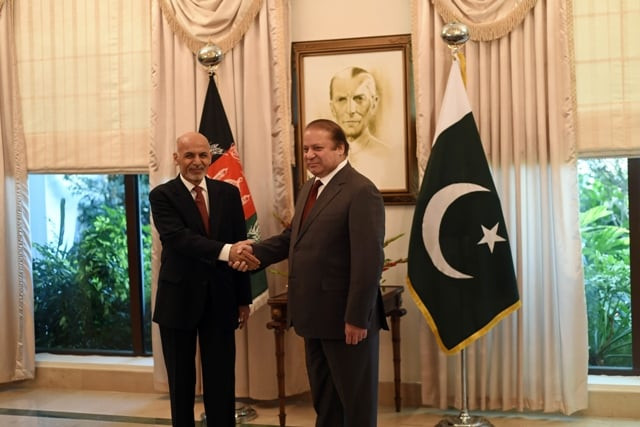Neighbourhood watch: Afghanistan eyes paradigm shift in relations with Pakistan
Analysts say Ghani’s recent visit to Pakistan will bear more fruit than Karzai’s multiple sojourns.

Traditionally, the Afghan media has always been skeptical and dismissive of Pakistan. Yet, Afghan President Ashraf Ghani’s recent visit to Pakistan has made a cross section of the media appear optimistic.
Even with suspicion and some unfavourable comments, the majority of Afghan political commentators have attached high hopes to Ghani’s maiden state visit to Pakistan on November 14-15. During his stay, Ghani vowed to bridge trust deficit and open a new chapter in bilateral relations.
A visible change could also be seen in the approach of the National Directorate of Security (NDS), the Afghan intelligence agency, to spare Pakistan when its spokesperson Haseeb Siddiqi addressed a news conference about the growing number of Taliban attacks in Kabul and other cities.

Afghan electronic and print media was more focused on Ghani’s visit than its Pakistani counterpart. All major Afghan TV channels hosted debates on the possible outcome of the visit, particularly Islamabad’s role in peace talks with the Taliban.
Pashto and Dari language newspapers wrote editorials and published op-eds on the importance of the visit. And despite some mistrust, a majority of the political observers were convinced that Ghani’s visit would be much more fruitful than his predecessor Hamid Karzai’s 20 trips to Islamabad.
Pashto daily Sarnevesht described the visit as a good start, insisting that Pakistan should help the peace process and exert pressure on the Taliban to prepare for peace talks. “It should drive the Taliban, who oppose peace, out of its area or eliminate their hideouts and sanctuaries,” the daily said in an editorial this week.
Hasht-e-Subh, an independent Dari-language daily, viewed Ghani’s visit to the army’s General Headquarters in Rawalpindi as a significant step. “This was unprecedented. In order to achieve stability and a strong economy, Afghanistan needs constructive strategic relations with Pakistan. And if Pakistan wishes to overcome its economic and security problems, which are damaging it internally, it has to stop pushing an India-centric policy towards Afghanistan,” wrote the daily.

Pakistan’s role
Afghan papers also highlighted what they termed Pakistan’s important role in the peace process with the Taliban. Without the cooperation of regional countries, especially Pakistan, the peace process will fail and remain incomplete in Afghanistan, they said.
“If Afghanistan and Pakistan work together with complete sincerity and transparency, they can make it easier for the peace process to succeed,” said The Daily Afghanistan.
The pro-government Pashto daily, Weesa, said Afghans “can pin hopes” on thinking that the visit has opened a new chapter in bilateral relations. “Afghans want peace and tranquility. They want an end to the devastating war and to live in a peaceful atmosphere with their neighbours. If Pakistan helps the Afghan people and officials honestly meet these desires, there is no more good news than this for our people,” the daily said.
The Dari-language independent daily Hasht-e-Subh described the role of Pakistan’s security establishment as very important in the stability of Afghanistan.
“There is no doubt that if the Pakistani government, especially the Pakistani army, cooperates with the Afghan government, the situation in the region will improve,” it said.
State-owned daily Anis said the recent developments in Pakistan show the country’s political and military leaders have now agreed they should “make use of the opportunity and pursue a mild policy towards the new government of Afghanistan.”
Like Pakistani leaders, Ghani also had a clear approach to the relationship. “Pakistan is continuously our partner.”
“We have overcome obstacles of thirteen years in three days, thank you,” Ghani said during the joint presser with Prime Minister Nawaz Sharif on November 15.
He also received a pledge from senior Pakistani civilian and military leaders to help in the urgently-needed reconciliation process.
Pakistan’s Adviser on Foreign Affairs, Sartaj Aziz, said Pakistan will “facilitate” the peace process but it is up to Kabul to “take the initiative as with whom it wants to talk, where, and how.” While interacting with the Afghan media in the company of President Ghani, Aziz had rightly pointed out Pakistan cannot force anyone for talks but will help when the Afghan government takes the initiative.
The Pakistan Foreign Ministry on Thursday termed the visit “very successful as it was rich not only in symbolism but also in substance.”
The ministry’s spokesperson, Tasnim Aslam, said the agreed minutes contain 42 decisions and they cover a broad range in trade, economy and connectivity.
Published in The Express Tribune, November 22nd, 2014.













COMMENTS
Comments are moderated and generally will be posted if they are on-topic and not abusive.
For more information, please see our Comments FAQ